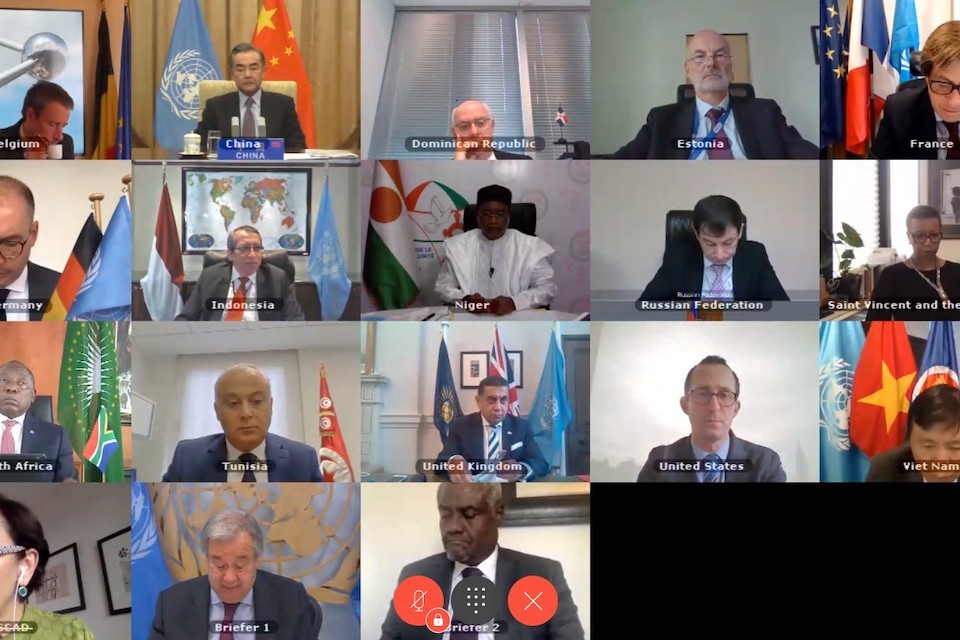Tackling the diverse challenges of COVID-19: Lord Ahmad's statement at UNGA 2020
Lord (Tariq) Ahmad of Wimbledon spoke at the United Nations Security Council high level open debate on Maintenance of International Peace and Security.

Thank you, President Issoufou, and thank you to Niger for convening this very important meeting. May I firstly join with others in thanking you, Secretary-General, for your valuable insights and also commend your efforts at leading us through this global pandemic. I also wish to thank his excellency Moussa Faki Mahamat for his contribution and the specific focus and insight he brought from across Africa and the response of the African Union.
And if I may, Mr President, I want to start with positives. As we face challenges, we often forget what has truly been achieved. The United Nations system, including importantly the World Health Organisation, has responded quickly to health, humanitarian and socio-economic needs, and deployed around the globe in places that are home to some of the world’s most vulnerable communities.
The World Bank and the International Monetary Fund have adapted their instruments to macroeconomic challenges posed by the pandemic, and worked importantly in partnership with the United Nations. And also the G20 moved swiftly to suspend debt service payments for the world’s poorest countries so that nations are supported in their direct efforts to protect lives first and to alleviate economic and financial crises.
And, as Minister for the Commonwealth, the 54 Commonwealth heads of government issued a joint statement (PDF, 84.8 KB) setting out a full range of international priorities in response to the pandemic, committing to work to mitigate the effects. And if I may importantly also acknowledge GAVI, the Vaccine Alliance, to which the United Kingdom recently pledged over $2 billion, that has seen nations coming together in search importantly for a solution to protect people with diseases.
Mr President, these examples show the international community, the global response, at its best – when we work together, when we meet our collective needs through multilateral working, through good faith and full cooperation between member states.
Yet, as much as this crisis has brought us together, there have been times when it has driven us apart. At times, geopolitics have tampered cooperation and hindered our agility. The pandemic has tested the international system like never before. It is therefore in our collective interest to ensure the multilateral system doesn’t just emerge from this crisis, but as it emerges from the COVID-19 pandemic, it is stronger, more together, to cope with the challenges in the future.
There will be a time to reflect on the lessons of this pandemic and how we prepare better for the next challenge. The UN reforms implemented over the last 2 years have been shown to work and we must continue and strive to improve all our international organisations. But, Mr President, now is not the moment to reject international institutions. Those principles that emerged from one of the darkest periods of human history, as the Secretary General reminded us, are needed again to bring us out of the lockdown and back into the light.
Preventing the indirect effects of this pandemic may prove harder still, with implications for international peace and security. We know, for instance, that the hundreds of millions of people around the world face food insecurity. And sadly, this will get worse. Therefore global cooperation is both critical and necessary to avoid catastrophe. And that is why the United Kingdom has made a call to action to prevent famine, with $150 million of new funding on top of the $1 billion we have already contributed to the international response. We have also appointed a new special envoy on famine prevention, Nick Dyer, and we urge all member states to support our collective efforts.
To conclude, Mr President, let me assure all colleagues, all partners, all member states, that the UK stands strongly by the values of the UN Charter. We believe strongly in its principles of peaceful international cooperation and, importantly, respect for human rights. This year, as we commemorate the UN’s 75th anniversary, we should all reaffirm our commitment to these valuable principles and in doing so, rebuild, equipped and support to ensure that we come together to tackle the challenges and avail the opportunities that lie ahead.
Thank you, Mr President.